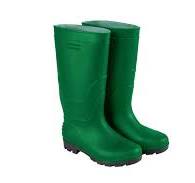The Essential Guide to Farm Boots
When it comes to working on a farm, having the right footwear is crucial. Farm boots are designed to provide comfort, durability, and protection for long hours spent in various agricultural tasks. Whether you’re tending to livestock, working in the fields, or navigating muddy terrains, a good pair of farm boots can make all the difference.
Key Features of Farm Boots
Farm boots typically feature:
- Waterproofing: Keeping your feet dry is essential when working in wet conditions.
- Steel Toe Caps: Protecting your toes from heavy objects and potential hazards.
- Slip-Resistant Soles: Preventing slips and falls on slippery surfaces.
- Comfortable Insoles: Providing cushioning and support for long hours of wear.
- Durable Materials: Withstanding rugged environments and frequent use.
Choosing the Right Farm Boots
When selecting farm boots, consider factors such as:
- The type of work you’ll be doing
- The terrain you’ll be navigating
- Your comfort preferences
- Budget constraints
It’s important to try on different styles and brands to find the perfect fit for your needs. Remember that investing in high-quality farm boots can enhance your productivity and protect your feet from potential injuries.
Maintaining Your Farm Boots
To prolong the life of your farm boots:
- Clean them regularly to remove dirt and debris
- Store them in a cool, dry place away from direct sunlight
- Treat them with waterproofing products as needed
By taking care of your farm boots, you can ensure they remain reliable companions throughout your agricultural endeavors.
Investing in a quality pair of farm boots is an investment in your comfort, safety, and efficiency on the farm. Choose wisely, maintain them properly, and let your footwear support you as you work hard to cultivate the land.
Top 5 FAQs About Choosing and Caring for Farm Boots
- What are the best farm boots for working in wet conditions?
- Do farm boots come with steel toe caps for protection?
- How do I choose the right size of farm boots?
- Are there farm boots specifically designed for different types of agricultural work?
- What are some tips for maintaining and caring for farm boots?
What are the best farm boots for working in wet conditions?
When it comes to finding the best farm boots for working in wet conditions, waterproofing is a key feature to look for. Boots that are specifically designed to keep your feet dry and comfortable in wet environments are ideal for farm work. Look for options with high-quality waterproof materials and sealed seams to ensure maximum protection against moisture. Additionally, slip-resistant soles can provide added traction on slippery surfaces, making them essential for navigating muddy terrains. Investing in farm boots that prioritize both waterproofing and slip resistance will help you stay safe and productive during rainy days on the farm.
Do farm boots come with steel toe caps for protection?
Farm boots are often equipped with steel toe caps to provide essential protection for individuals working in agricultural settings. The steel toe caps serve as a crucial safety feature, safeguarding the wearer’s toes from potential hazards such as heavy objects or machinery. This added layer of protection ensures that farm workers can carry out their tasks with confidence, knowing that their feet are shielded from potential injuries. When considering farm boots, opting for a pair with steel toe caps can be a wise choice to prioritize safety and peace of mind in demanding farm environments.
How do I choose the right size of farm boots?
When selecting the right size of farm boots, it is essential to prioritize comfort and functionality. Start by measuring your feet accurately, considering both length and width. Keep in mind that different brands may have slightly varied sizing charts, so it’s advisable to refer to the specific brand’s guidelines. When trying on farm boots, ensure there is enough room for your toes to wiggle without being too loose or tight. Remember that a proper fit is crucial for preventing blisters, discomfort, and potential foot injuries during long hours of work on the farm.
Are there farm boots specifically designed for different types of agricultural work?
When it comes to farm boots, there are indeed specialized designs tailored for various types of agricultural work. Different tasks on the farm require specific features in footwear to ensure maximum comfort, safety, and performance. For example, dairy farmers may benefit from boots with extra insulation for long hours in cold environments, while vineyard workers might prefer lightweight and flexible boots for agility in vineyard rows. From waterproofing for wet conditions to puncture-resistant soles for working with sharp objects, there are farm boot options available to suit the diverse needs of different agricultural roles. Choosing the right farm boots designed for specific tasks can enhance efficiency and protection on the farm.
What are some tips for maintaining and caring for farm boots?
Proper maintenance and care of farm boots are essential to ensure their longevity and performance in agricultural settings. Some tips for maintaining and caring for farm boots include regularly cleaning them to remove dirt and debris, storing them in a cool, dry place away from direct sunlight to prevent damage, and treating them with waterproofing products as needed to maintain their water resistance. By following these simple yet effective maintenance practices, farmers can extend the lifespan of their farm boots and continue to rely on them for comfort and protection during long hours of work on the farm.

